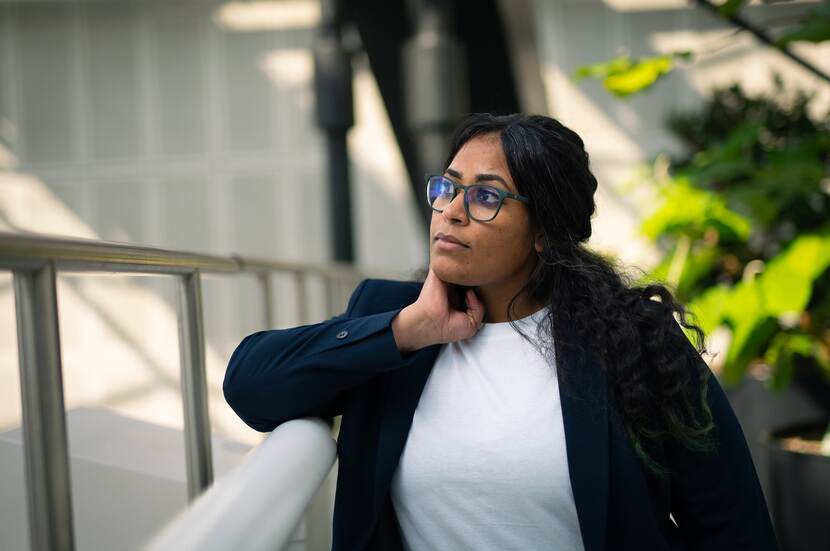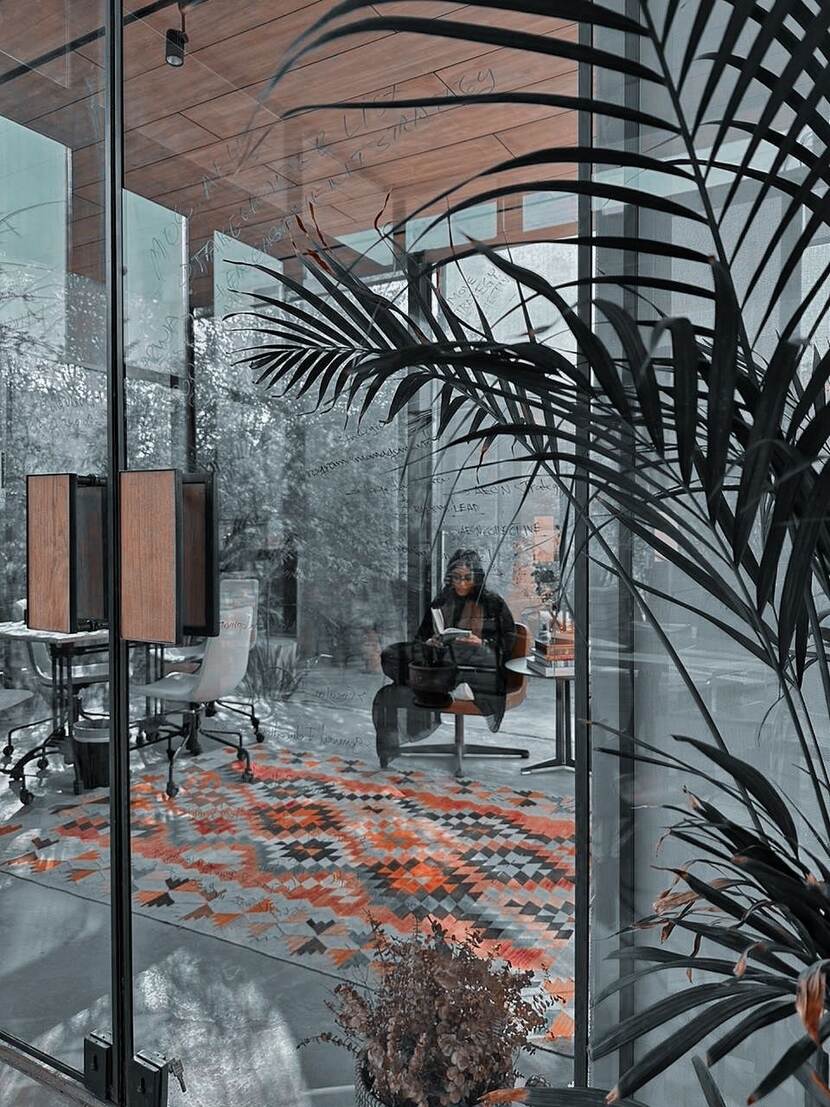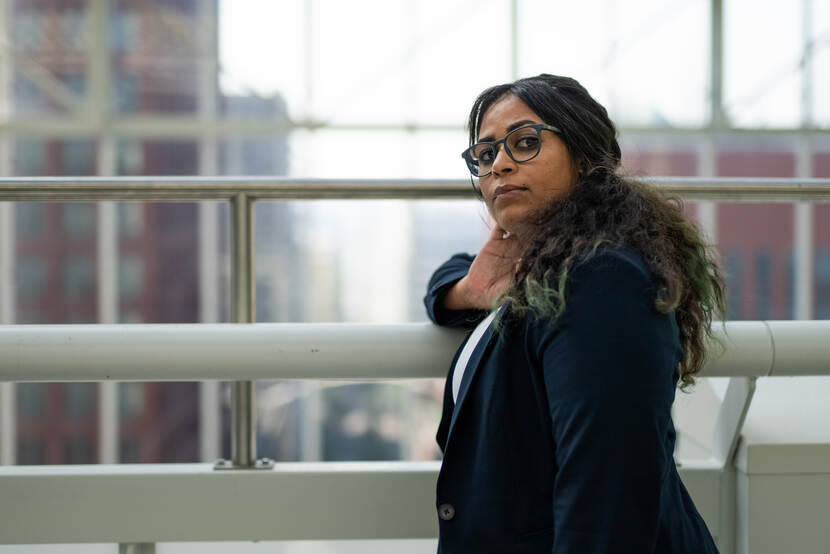‘Feeling different is my superpower’
Weblogs
As a Sudanese little girl, she felt different, like she didn’t belong anywhere. That feeling drives Meaad Osman Abdalla to this day. ‘It doesn’t paralyze me anymore, it’s my superpower.’ Meaad manages key initiatives at Aeon Collective, a non-profit endowment fund committed to advancing sustainability and development. Recently she took part in the Women Leadership Programme of the Dutch Ministry of Foreign Affairs, that empowers women to become influential leaders and role models.

Meaad was born and raised in Saudi Arabia, but she started her education in Sudan. ‘I played outside as much as possible and I hated school. I would sit still just long enough to do the teacher’s assignments, and then I would go outside to play as quickly as possible. Despite this, I passed at the top of my class. I was the kid who broke toys—and, I have to admit, sometimes home appliances—just to see how they worked.’
When she came back to Saudi Arabia she felt like she was different: ‘I wasn’t Saudi and you could see it by my skin color and hair type.’ The feeling of being an outsider has haunted her since she was young: ‘I’ve always felt different. I was a walking contradiction, an outlier by design.’
'In my professional career, I was stuck in a web of gender norms and professional expectations. Being a female engineer was, apparently, as confusing as a talking dog.'
This feeling persisted throughout her life. ‘Also in my professional career, I was stuck in a web of gender norms and professional expectations. Being a female engineer was, apparently, as confusing as a talking dog. Some male colleagues thought I wasn’t ‘man enough’ to be an engineer, constantly trying to teach me the basics during site visits. Others believed I was too cool and creative to succeed.’ But the feeling of not belonging anywhere does not paralyze her anymore. ‘It is my superpower.’
Women Leadership Programme
Recently Meaad took part in the Women Leadership Programme in the Netherlands, a programme of the Dutch Ministry of Foreign Affairs that empowers women to become influential leaders and role models. Participants from the Middle East and North Africa region (MENA) engaged with government officials and organizations, participated in several training sessions, and built networks to enhance their leadership capabilities, aiming for lasting success beyond the programme.
Meaad enjoyed the Programme immensely: ‘I had the opportunity to connect with many organizations in the Netherlands, all working towards a common goal: making the world a better place for everyone. The struggles that women in the MENA region face are unique to them. However, there are also challenges that need addressing for women in general, even here in the Netherlands.'

Tribe
With a background in engineering, space, and satellite communication, Meaad excels in analyzing, interpreting, and visualizing data to drive impactful change. She manages key initiatives at Aeon Collective, an interdisciplinary, non-profit organization committed to advancing sustainability and development. At Aeon Collective, Meaad says she found her 'tribe', with which she wants to build a better world. ‘We share a mission: to save and repair the planet.’
One notable initiative Meaad leads is the 'Tree Library' for community-led spaces, which integrates communities, nature, technology, and wisdom. The idea for Tree Library came about during the covid period: ‘We first held talks, the Saudi Sustainable Talks in our garden offices. During the pandemic, we wanted to hold those talks online, but that didn't work at all. Then we started holding talks in our garden as a safe space. We expanded that concept and are now developing seven locations around the world: from Liberia and Kuwait to New York, Jamaica and Greece. Each location has its own theme, such as energy security in Liberia and land degradation in Greece.’
'I think the most pressing issue in Saudi Arabia for women is the employment opportunities. It wouldn’t necessarily be considered a rights issue in the traditional sense, but more of a challenge rooted in global stereotyping.'
Female involvement
As interim CEO of Women & Energy NGO, Saudi Arabia's first NGO dedicated to increasing female participation in the energy sector, Meaad advocates for female involvement in this field. What does she think are some of the most pressing women's rights issues in her country today?
‘When it comes to Saudi Arabia, I think the most pressing issue is the employment opportunities, particularly in certain sectors. For example, in the energy sector, I see this as a significant challenge. It wouldn’t necessarily be considered a rights issue in the traditional sense, but more of a challenge rooted in global stereotyping. Women engineers, for instance, face discouragement from studying fields like technology and engineering, and this kind of stereotyping is something I view as one of the pressing issues in Saudi Arabia right now.’
‘When it comes to my home country Sudan, there are many issues, but the most pressing one at this time is directly related to the war. Women do not have access to small, very basic, fundamental services. This is, of course, if we set aside the horrifying reality of rapes that are happening and all the violence women are enduring during this period.’
'Whenever a woman is seen as being too independent - or even just independent - this is often perceived as a safety issue.'
‘Write your own story’
What are the main cultural or societal barriers that people face when striving for gender equality? ‘I believe the social barrier might stem from the protective nature of families in the Middle East. Essentially, they feel a sense of responsibility for their female counterparts and aim to protect them. So, whenever a woman is seen as being too independent - or even just independent - this is often perceived as a safety issue.’
‘As a result, men tend to act protectively toward women, regardless of the actual situation. This can lead to segregation between males and females in various spheres, such as the job market, employment, education, and even basic responsibilities. This social norm, the protective instinct, creates a divide, and it seems that males may also feel somewhat threatened by independent females, for reasons I can’t fully comprehend.’
For young women aspiring to become leaders in their own field, Meaad hopes they will do what she did and ‘write their own story’. ‘I would say to them: remember that you are valued, no matter your background, culture, or the challenges you face. Your uniqueness should be celebrated. I have always felt like an outsider, but there is a place for me as well. And I have found many women like myself to connect with.’
